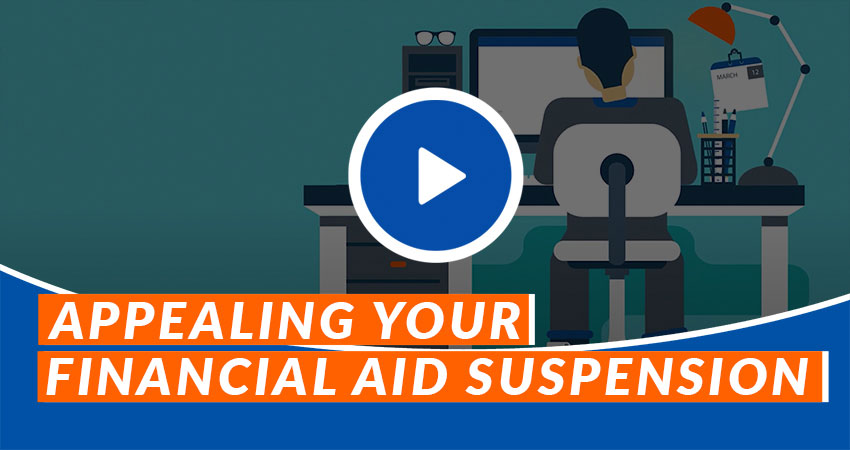Are you a college student who has received some bad news about your financial aid package? Do you need clarification on why your financial aid has been suspended or when it will be reinstated? If so, you are not alone!
Millions of students each year find themselves grappling with the challenges of navigating their financial aid program and understanding all the rules related to their packages. This blog post'll discuss what Financial Aid Suspension means and provide helpful tips for regaining eligibility. Read on to learn more!
Understanding Financial Aid Suspension
Financial aid suspension is when a student's eligibility for financial assistance has been put on hold, usually due to unsatisfactory academic progress or the failure to meet other program requirements.
Understanding why your financial aid has been suspended can be daunting and confusing, particularly if you've never encountered this. In most cases, financial aid suspension means that you are eligible for further grants, loans, or scholarships once you have addressed the issue that led to your suspension in the first place.
Why Are You Experiencing Financial Aid Suspension
There are several potential reasons why you may be experiencing financial aid suspension. The most common reason is due to unsatisfactory academic progress (SAP). To maintain eligibility for financial aid, you must meet certain academic standards set forth by your school. This includes completing the required classes and earning specific grades or GPAs each semester. Your financial aid can only be suspended if you meet these requirements.
Another reason could be related to the criteria used to determine your eligibility in the first place. For instance, if you applied for need-based assistance but your family's income or financial circumstances have changed, this could affect your eligibility for certain programs. Or you may need to submit important paperwork or information on time, resulting in suspension.
Lastly, financial aid suspension could result from failing to meet the terms and conditions of your agreement with your school or the federal government. This includes ensuring you are enrolled in an eligible program, attending classes regularly, and not owing any refunds to your school or loan provider.
Reasons Your Financial Aid Might be Suspended
- Failing to make satisfactory academic progress
- Failing to meet credit hour requirements
- Lack of attendance in classes
- Receiving “incomplete” grades or failing grades
- Not submitting documents on time (e.g., FAFSA verification forms)
- Changes in family income or financial circumstances
- Exceeding loan lifetime limits (if applicable)
- Failure to repay a previous grant, loan, or scholarship
- Alterations made to your admissions application, transcripts, etc.)
- Not taking the required number of credits each semester/term
- Not meeting Satisfactory Academic Progress (SAP) standards
- Withdrawing from classes or dropping out of school
- Making corrections to your FAFSA form after the deadline
- Fraudulent activity on your financial aid application
- Conflicting information reported on the FAFSA form and verification documents
Benefits of Financial Aid Suspended
1. Increased awareness of your financial aid eligibility
2. Opportunity to take required classes and meet academic standards
3. Ability to afford college without taking out loans
4. Time for you to explore alternative funding sources, like scholarships
5. Chance to make corrections to your FAFSA form or admissions documents if necessary
6. Opportunity to apply for grants or other awards that may be available at the school level
7. A better understanding of the rules and regulations related to financial aid packages
8. The chance to re-submit a new FAFSA form with updated information, if necessary
9. Greater insight into how your family’s finances affect your eligibility for aid
10. The opportunity to discuss the issue with a school advisor or financial aid officer and come up with an action plan to restore your aid eligibility.
Appealing and Avoiding Financial Aid Suspension
If your financial aid has been suspended, you can appeal the decision and have it reinstated. Each school's process is different, but generally speaking, you must submit a written appeal with supporting documentation outlining why you should be eligible for financial aid again.
Be sure to include any mitigating factors that might have caused you to become ineligible (e.g., death in the family or catastrophic medical bills). You may also need to provide an academic plan for how you will meet the academic requirements of your financial aid program moving forward.
You must follow all directions provided by your school when appealing your suspension. Otherwise, your appeal could be denied. Additionally, ensure you know any deadlines associated with the appeal process.
It is also important to have a plan in place for avoiding financial aid suspension in the future. Start by understanding the rules and regulations associated with your specific financial aid package to stay compliant.
Other Options for Financial Aid During a Suspension
Yes, there are other options for financial aid during a suspension. The first option is to look into alternative funding sources, such as scholarships or grants from private organizations. Some schools also offer tuition assistance programs that can help cover costs while your financial aid is suspended.
Consider taking out a loan through the federal government or a private lender. However, it's important to remember that you will still be responsible for paying back any loans you take out - even if your financial aid eligibility is later reinstated.
Additionally, exploring work-study opportunities at your school would be best. Jobs provide students with funds to help pay for college expenses and allow them to gain valuable real-world experience. Many schools also offer student employment programs, so check with your college's financial aid office for more information.
FAQs
Q: How can I determine why my financial aid has been suspended?
A: You should contact your school’s financial aid office and ask them about the reason for your suspension. Usually, there will be a form or letter outlining why your aid was suspended and what you can do to regain eligibility. The school should provide additional guidance on the steps needed to reinstate your financial aid.
Q: What are some tips for regaining my eligibility?
A: Some helpful tips for regaining your financial aid eligibility include making sure all documents requested by the school are submitted promptly, working with an academic advisor or counselor to ensure you’re staying on track, keeping up with any debt payments, and attending classes regularly. Depending on your particular situation, you may also take other measures, such as appealing the suspension or requesting an extension if needed.
Q: What should I do if I still need help regaining my eligibility?
A: If you still have difficulty understanding or complying with the school’s requirements, contacting a financial aid counselor may be a good idea. They can provide additional guidance and assistance as you navigate regaining your eligibility. Additionally, numerous online resources can help answer specific questions and offer advice on getting back on track.
Conclusion
Financial aid suspension can be a difficult and overwhelming situation to navigate. It’s important to remember that you have options, and it is possible to regain your eligibility with the right steps. Be sure to reach out for help, and don’t hesitate to ask questions. With the right guidance and effort, you may soon be back on track with your financial aid package. Good luck!



